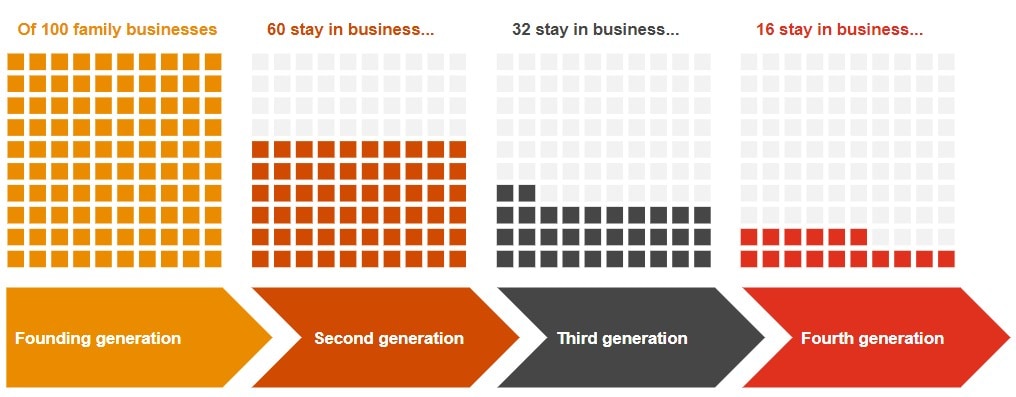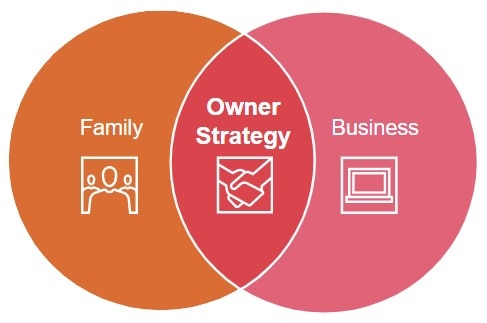{{item.title}}
{{item.text}}

{{item.title}}
{{item.text}}
July 2020
By Fung Mei Lin, Entrepreneurial and Private Business, Lead Partner, PwC Malaysia
Family-owned businesses, which make up 80-90% of firms worldwide, are important drivers of national Gross Domestic Product (GDP) and job growth. As family businesses are built from the ground up on the back of owners' hard work and effort, it stands to reason that they would strive to preserve the business that had been founded or entrusted to them for the generations to come. This is no different in Malaysia.
However, not all family businesses survive. Beyond the day-to-day business operations and market forces, family businesses also need to contend with the dynamics among family members, especially around money, power and love. These three factors, if not addressed in the early stages, can cause even strong families and successful companies to stumble and sometimes fail.
There is a popular saying in family business circles - the first generation starts a business, the second generation runs it, and the third generation ruins it. PwC’s Family Business Survey 2018 has shown that, statistically, this saying is quite valid with very relatively few family businesses surviving past the third generation. The results of our study can be seen in the diagram below.
Source: Prof. Dr. Peter May, founder of INTES Family Business Academy, part of the PwC network
A key question that leaders of family businesses should ask themselves is, “Do I want to leave a legacy for my family?”
A common characteristic of most successful family businesses is that they understand family comes first, and that cohesion among family members is key to ensure business continuity and success. The current or next generation looking to lead their family business to long-term success needs to understand the unique characteristics of their family ownership, and investment and governance structure in order to find the answers to the challenges they are facing, or anticipate they will face. This has to be balanced against the diverse interests and expectations of family members, including those working in the business and those who are not.
To achieve this, they need to have in place a well-defined framework to achieve a good balance between professional management, responsible business ownership and a healthy family dynamic - and that’s where owner strategy comes in.
The leader of the family business has the ultimate responsibility to initiate the owner strategy and define the “rules of the game” for the family. A well-thought through owner strategy should integrate family and business interests in a structured way.
An effective owner strategy is not a product of chance. Our experience shows that a robust owner strategy with the correct family governance structure is the result of a process rather than a decision or imposition of a solution.
From what we’ve observed in our work with family businesses, the leader’s vision is usually the driver behind many decisions. It’s important that this vision is communicated to and understood by other members of the family to align their actions towards achieving the shared vision. This alignment is why we believe they can, and should, begin the structured process of coming up with an owner strategy that links both the family strategy and business strategy and provide a framework to help address current and future matters that may arise.
Tough questions need to be addressed in forming an owner strategy, such as:
What are the succession principles
What goals do we want to achieve as a family
Which structures should apply to the company and the family
What is the dividend policy
How do we deal with conflicts, etc.
There are other aspects surrounding the membership, goals and values, business model, corporate governance, and roles and responsibilities that need to be defined in the owner strategy. Therefore it is important to ensure an atmosphere of respect, openness and understanding (though this may not necessarily mean agreement) for the family in articulating their views.
Here’s how a well-managed owner strategy process can make a real difference:
Helps professionalise family members through open discussion
Fosters family cohesion and opens up new ways for interaction
Creates an experience for improvement of family dynamics
Helps resolve conflicts while still manageable
Start early. This is vital as family members need to know what to expect and it takes time to reach a mutual understanding for some of the tougher issues they need to address. Even in families with a plan, it takes time to adjust and adapt.
Involve next generations in the process so that they are aware of the responsibilities attached to their inheritance. Their views are also important to bring greater alignment of family strategy and business strategy.
Be specific about your goal and values. Write them down and act on it. Otherwise, with time, different family members could have different ways of working that may not be aligned to the family’s goals and values.
Ensure a fair and transparent process. When it is impossible to reach an agreement, agree to disagree and look for an overarching goal. Sometimes, a third-party moderator can facilitate an unbiased discussion to reduce potential family tension.
Communication, communication, communication. Decisions need to be made through a process of consultation. Everyone who has a stake in the future should be given a chance to share their views. No matter what choice is made, constant communication with family members is essential.
Ultimately, each family business is unique. It will not be possible to have a one-size-fits-all solution for owner strategies. But one thing is for sure - business success cannot make up for family failure. Don’t leave the legacy of your family business to luck and chance. Developing an owner strategy is not easy, but it is necessary. If implemented well, it offers the opportunity to secure a lasting legacy for the family and the business.
In our next blog, we will be discussing the key considerations to think about when developing your own owners’ strategy. Watch this space and let us know your thoughts.

Fung Mei Lin
Tax Partner and Entrepreneurial & Private Business Leader, PwC Malaysia
Tel: +60(19) 224 7668

